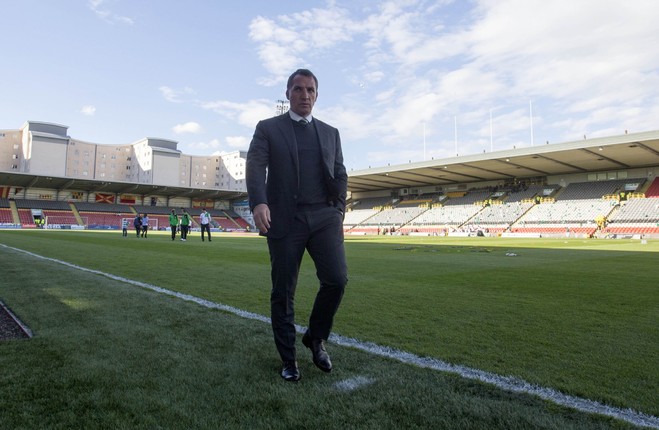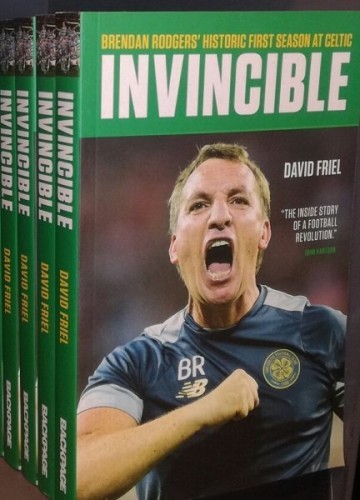THERE WERE CHUCKLES and raised eyebrows galore as Brendan Rodgers addressed the assembled Scottish football media following his side’s 2-0 victory on 21 May.
It perhaps strikes as a routine Celtic victory, but this one was far from ordinary. Neither was Rodgers’ team-talk for what was, to that point, his side’s biggest game of the season. Indeed, neither is Rodgers, as he gratuitously revealed to bemused journalists in the press room at Parkhead.
“It was after the Hearts game, and Celtic had finished the league season without losing a game,” recalls David Friel, author of Invincible: Brendan Rodgers’ First Season at Celtic.
When asked what he did to get his players over the line, he basically said, ‘Well, I wrote a word up on the board, but initially only Stuart Armstrong knew what it meant’ – Stuart Armstrong is actually studying for a law degree. But Brendan says: ‘I wrote up infrangible – does anybody here know what it means?’
“I think only a couple of people in the press room said they knew what it meant, but Stuart Armstrong did,” laughs Friel.
Two years ago, Rodgers would have been flirting precariously with self-parody, here. But he’d just led Celtic to the first undefeated Scottish top-flight season for 118 years, and ears were duly perked for a translation.
He described it as, ‘to be unbroken, to feel that way’.
Football journalists are accustomed to hearing gobbledygook at pressers, of course, but for the majority who left Celtic HQ that day, they did so having picked up a legitimate new term. That imparting of wisdom from a contented Rodgers was perhaps a microcosm for Celtic’s season, which six days later culminated in a Scottish Cup final triumph over Aberdeen – and more importantly, just this once – an undefeated domestic season spanning three competitions.
“It is one of these techniques that Brendan has become known for,” says Friel, whose book explores many of Rodgers managerial methods. “The players have completely bought into these motivational techniques. He’s learned a lot from his Liverpool experience, but he still has ways and means of getting into players heads and motivating them.
“People will talk about Moussa Dembele and Scott Sinclair. Obviously Dembele was coveted elsewhere, and in Scottish terms, getting Scott Sinclair was quite a coup. Okay, he had probably lost his way a bit, but you’re getting a guy who had played at a high level, played for Man City. But for me, the biggest thing that Brendan did last season wasn’t anything to do with the so-called stars, but it was that he improved players who people had pretty much written off.
Guys like Callum McGregor, Scott Brown, Craig Gordon, Dedryck Boyata… Stuart Armstrong is a prime example, James Forrest another one. They’ve turned their careers around. I think five guys signed new contracts due to the upturn in their performances, and Stuart Armstrong is now being talked about as a £10m player. Before Brendan arrived, he couldn’t get in the Celtic team.
“The manager has taken those guys who hadn’t been performing to the best of their capability, and brought the maximum out of them, and gotten even more than anyone would have believed possible out of them. Those players, a lot of Celtic fans would have written them off and thought, ‘if they go, they go’. But they’re now main-stays and have reached heights that very few could have imagined. Watching that unfold is part of the reason why I wrote the book, to be honest with you. It was fascinating to see the development of this team and these players who I thought were just going to be cast aside, but ended up shattering all kinds of records.
“But I think as well, if you look at what Brendan did for Daniel Sturridge – because Sturridge is probably one that, as a young guy, was perceived as the next big thing but lost his way slightly – Brendan takes him to Liverpool, and gets the best out of him. And we haven’t really seen anything like that from Sturridge since.”
Author and journalist Friel spent four years writing for The Celtic View, the club’s official magazine, between 2006 and 2010. During that spell, he took in two runs to the last 16 of the Champions League under Gordon Strachan. It was his coverage of Rodgers’ Celtic for the Scottish Sun, however, which inspired his new book, and in particular Rodgers’ innate ability to cultivate a culture of togetherness at the club.
Detailed in the book, for example, is Kieran Tierney and Scott Sinclair’s close relationship, which bore much fruit down Celtic’s left wing throughout their historic campaign. The pair have an ongoing darts rivalry, taking each other to task at the oche in Lennoxtown every day without fail. Friel pinpoints one moment early in Rodgers’ reign in which he made his demands for a healthy atmosphere clear to the club captain.
“It comes down to the team spirit that Brendan is able to foster. Much of it goes back to a conversation he had with Scott Brown in his house in London, pretty much before they’d even done anything. He basically said to Scott: ‘I need you to be the guy who is the leader here. I don’t want any cliques in the dressing room. I want everyone together.’
“And if you speak to guys like Scott, who’s been at Celtic for 10 years, he’ll tell you that the atmosphere and the togetherness in the squad is up there with the best he’s experienced. And this is a guy who’s played in a lot of successful Celtic teams.”
But for all their phenomenal achievements last term, Celtic’s season might well have been derailed on their return to the Champions League group stages. Instead, one ill-fated night in Catalonia presented Rodgers with an opportunity to further rubber-stamp his ideology, which his players had abandoned on the night.
Two weeks later, they kick-started their entire season with an enthralling Battle of Britain with Premier League leaders Manchester City, who to that point had won all six of their league encounters. From desolation in Camp Nou, Rodgers and his players manufactured an occasion in Glasgow’s East End which likely registered on the Richter Scale. And with that, they were up and running.
“It was a low, then a high, and I think the two games were crucial,” says Friel. “The Barcelona game, 7-0, was a record European defeat, but I don’t think it should be underestimated in terms of how important it was for the players to gain an understanding that they couldn’t just be happy to be in the tournament – they had to go and compete. But Brendan wanted them to compete in a certain way; he talked about pressing, and Celtic didn’t do that against Barcelona. Okay, this was an unbelievable team in Barcelona, but Celtic never made it hard for them. They were passive, they never got in and about them, they only committed three fouls all night. And after the game, Brendan wasn’t defending the result but he was calm in public. Privately, it was extremely different.
“Maybe something clicked, and the players realised what he wanted them to do in terms of pressure, in terms of shutting space down, in terms of working harder. And if you look at the 90 minutes against Barcelona and compare it to the 90 minutes against Man City, it was as if the penny dropped. I think the City game was the night that team believed it could compete at a higher level, and also that it could play the way Brendan Rodgers wanted. I think that night, people from outside of Scotland realised, ‘okay, this is actually a good team’.
Brendan made that point to the players: ‘You’re not playing like that against some nobodies in Europe. This is a team that nobody can take points off in England. This is a team which people are raving about, with one of the best managers in the world’. It was something tangible to show the players: ‘This is what you’re capable of if you believe in what I’m saying. If you work hard, this is what you can do’.
“From there, Celtic probably didn’t look back.”
Invincible: Brendan Rodgers’ First Season at Celtic is out now in paperback and ebook, published by BackPage.
The42 is on Instagram! Tap the button below on your phone to follow us!


